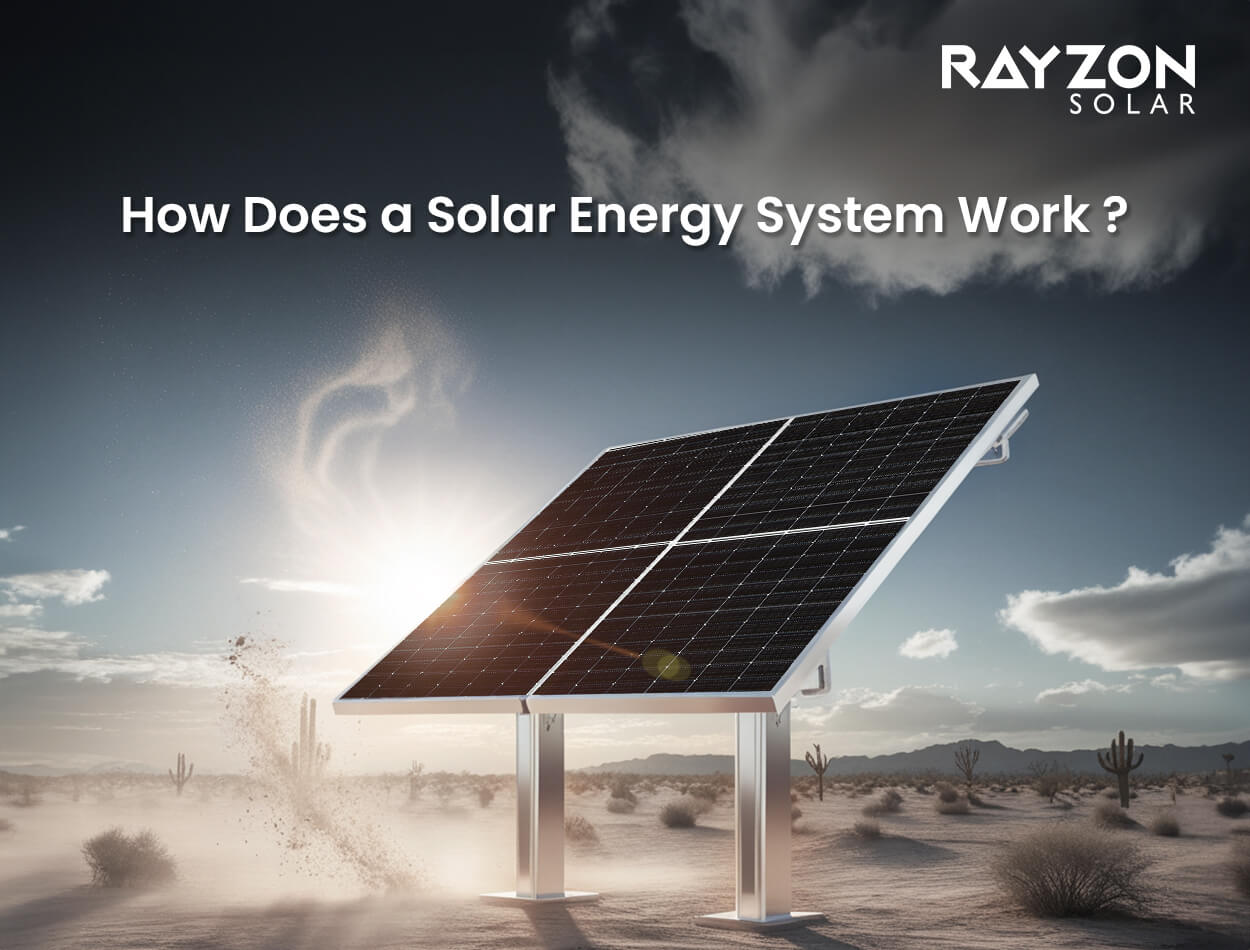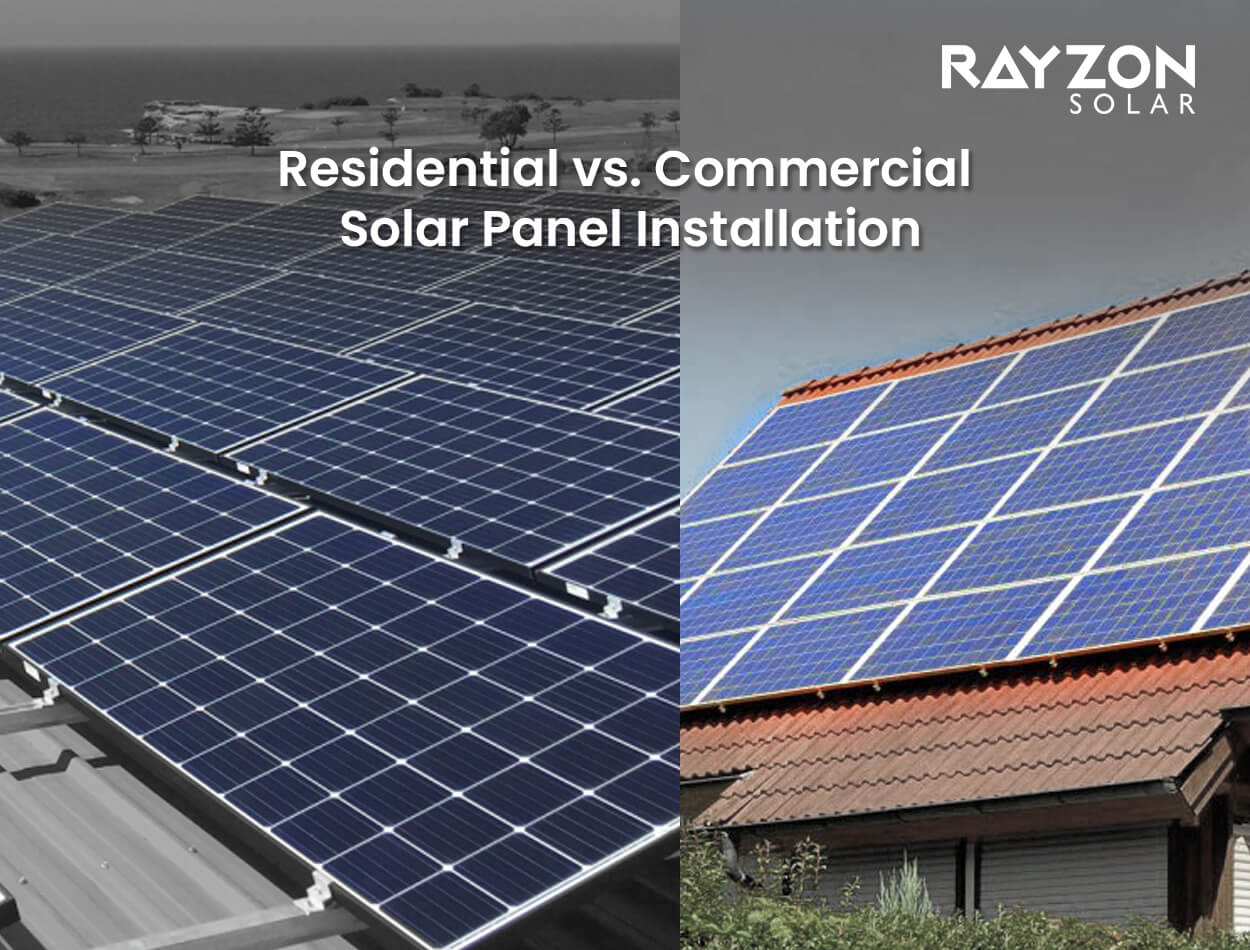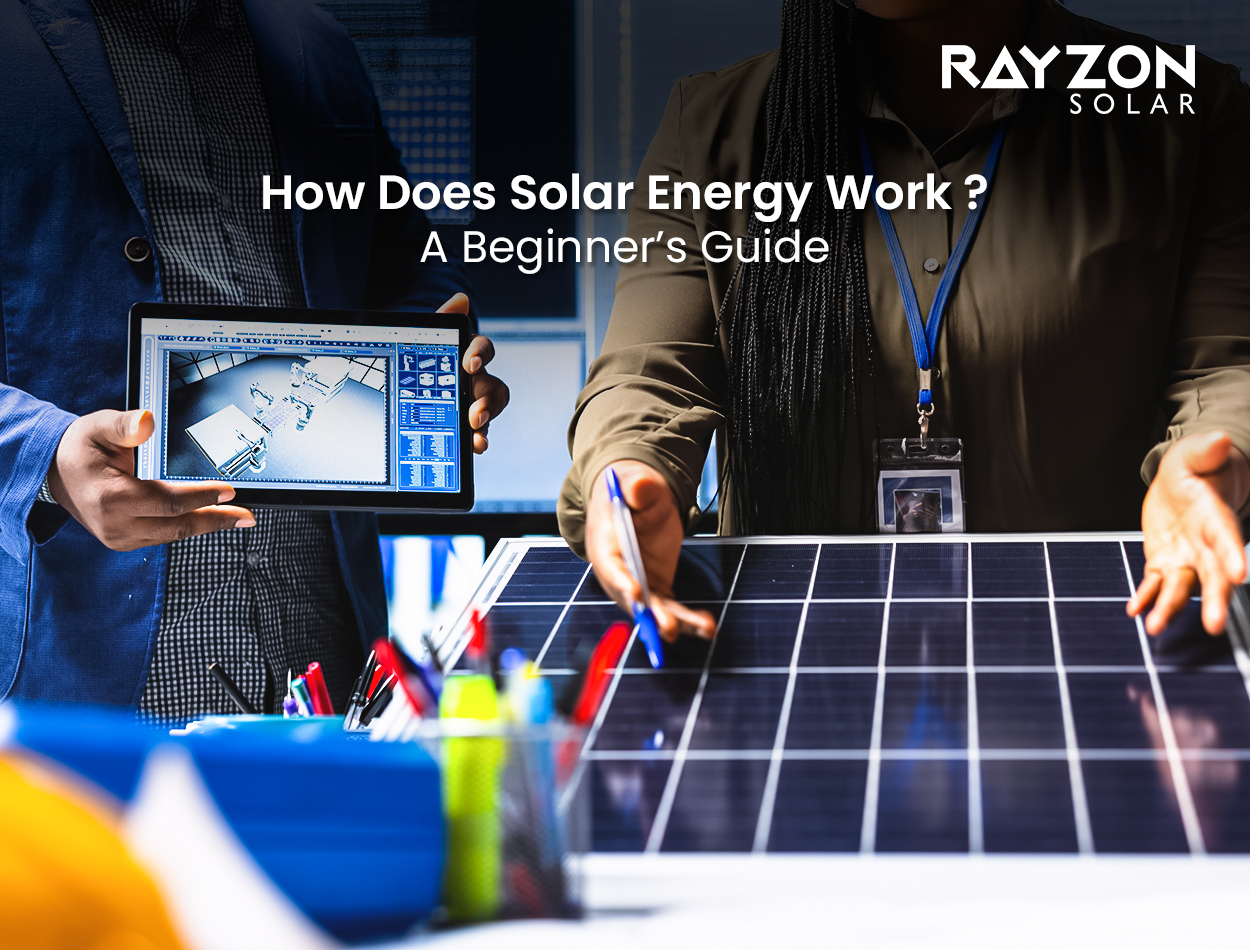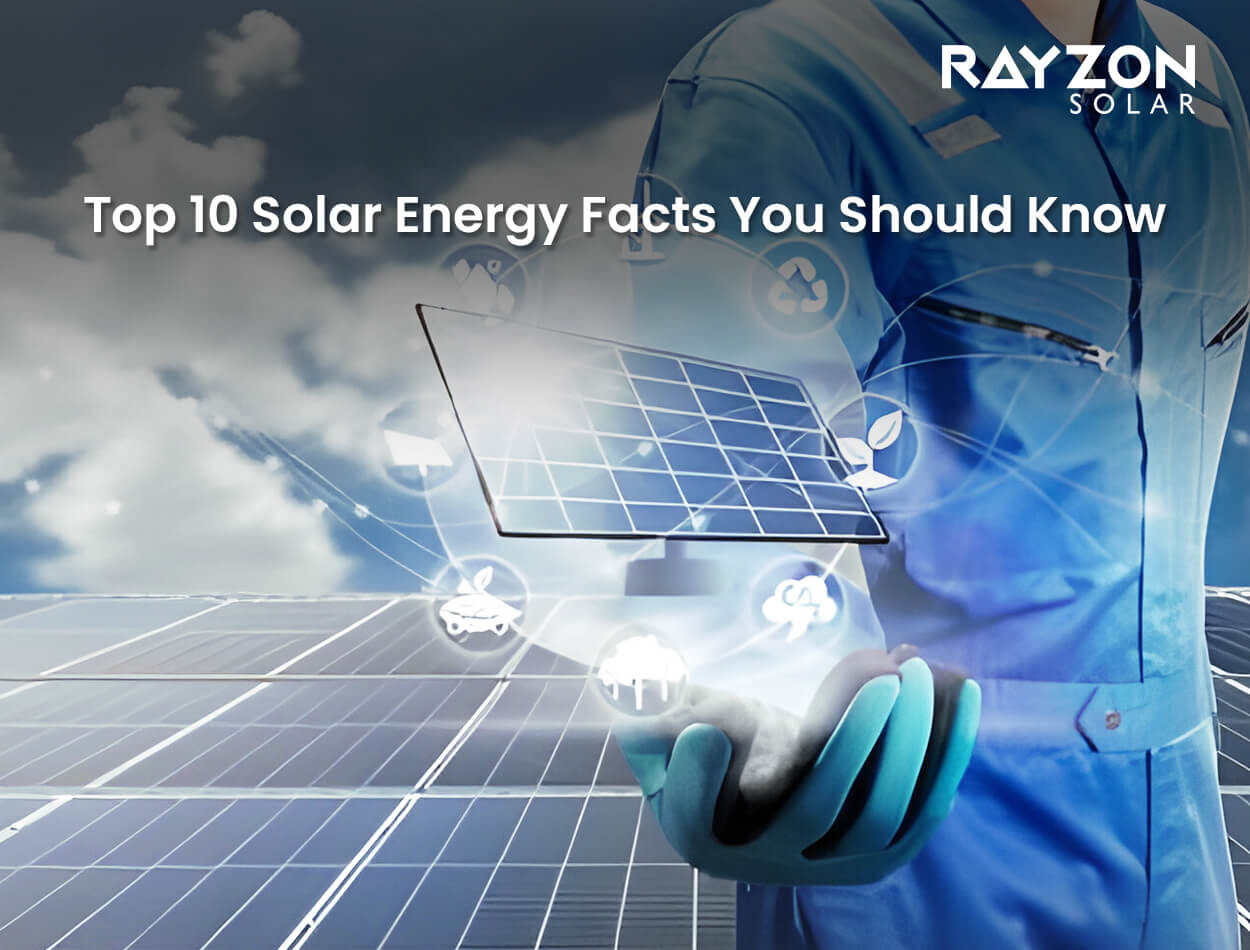
How Does a Solar Energy System Work? A Comprehensive Guide
The world is rapidly embracing renewable energy sources, and solar energy has become a leading contender in this green revolution. Solar energy systems harness the power of the sun to generate electricity, making them an eco-friendly and sustainable alternative to traditional energy sources. As solar technology advances, more homeowners and businesses are turning to solar panels to meet their energy needs. But how exactly does a solar energy system work? In this blog, we'll explore the details of solar power, from how solar panels convert sunlight into electricity to how this energy is stored and used, even at night.
Solar energy systems are not just about placing panels on a roof; they are involved systems that require careful planning and installation to maximize efficiency and output. With Rayzon Solar, one of the top solar panel manufacturers in India, leading the charge, understanding the internal workings of these systems can help you make informed decisions about adopting solar energy for your home or business. Whether you're interested in reducing your carbon footprint, lowering your energy bills, or simply understanding how solar power works, this comprehensive guide will provide you with the insights you need.
What is a Solar Energy System?
A solar energy system, also known as a solar PV system, is designed to convert sunlight into electricity. This system typically consists of several key components, including solar panels, inverters, batteries, and a solar generator. Each of these components plays a vital role in capturing, converting, and storing solar energy for use in residential or commercial settings.
Solar Panels: The Powerhouse of the System
Solar panels are the heart of any solar energy system. These panels are made up of photovoltaic (PV) cells, which are responsible for converting sunlight into direct current (DC) electricity. When sunlight hits the PV cells, it excites the electrons within the cells, creating an electric current. The more sunlight the panels receive, the more electricity they generate, making the placement and angle of the panels crucial for maximizing energy production.
Read More:Why Rayzon Solar Panel is the Best Solar Panel in India?
Inverters: Converting DC to AC
Once the solar panels generate DC electricity, it need to be converted into alternating current (AC) electricity, which is the standard form of electricity used in homes and businesses. This is where the inverter comes into play. The inverter's role is to convert the DC electricity from the solar panels into AC electricity that can be used to power applications, lights, and other electrical devices. Without the inverter, the electricity generated by the solar panels would be incompatible with the electrical grid and household systems.
For a deeper understanding of how this conversion process works, you can explore our detailed blog on How Solar Energy is Converted into Electricity
From Solar Panels to Inverters: The Journey of Solar Energy
The journey of solar energy begins with solar panels capturing sunlight. These panels are typically installed on the roof of a building, where they can receive maximum coverage of the sun. The solar panels consist of multiple photovoltaic cells, usually made of silicon, which absorb photons from sunlight. When these photons strike the cells, they knock electrons loose, creating a flow of electricity.
If you're considering purchasing solar panels and want to understand the process better, check out our detailed guide on How to Buy a Solar Panel & Its Process.
This DC electricity is then guided from the solar panels to the inverter, which converts it into AC electricity. The AC electricity is then distributed through the building to power various devices and appliances. Any excess electricity generated by the solar panels can be fed back into the grid or stored in batteries for later use, depending on the type of solar energy system installed.
How Solar Power is Stored
One of the key challenges of solar energy is its alternating nature. The sun doesn't shine 24/7, which means that solar panels don't generate electricity continuously. To address this issue, many solar energy systems include batteries that store excess electricity generated during the day. These batteries allow the system to continue supplying power even when the sun isn't shining, such as during night-time or cloudy days.
Batteries are particularly important for off-grid solar systems, where the building is not connected to the electrical grid. In these cases, the batteries provide a reliable source of power when the solar panels are not generating electricity. The stored energy can be used to power important devices and appliances, ensuring a continuous supply of electricity.
Solar Power at Night: How Does It Work?
One of the most common questions about solar energy systems is how they work at night when there is no sunlight. The answer lies in the combination of batteries and the electrical grid.
Battery-Powered Systems
For homes with off-grid solar systems, batteries play a crucial role in providing power at night. During the day, when the solar panels generate more electricity than the home needs, the excess energy is stored in the batteries. At night, when the panels are not producing electricity, the system draws power from the batteries to keep the lights on and the appliances running.
If you're considering whether investing in a solar battery is worth it, especially in 2024, you can explore the current Solar Battery Prices and Benefits to make an informed decision.
Grid-Tied Systems
For homes connected to the electrical grid, solar energy systems can still provide power at night through a process known as net metering. During the day, any excess electricity generated by the solar panels is sent back to the grid, and the homeowner receives a credit for this energy. At night, when the panels are not producing electricity, the home can draw power from the grid, effectively using the credits earned during the day. This ensures that the home always has access to electricity, even when the sun isn't shining.
For those considering an off-grid lifestyle, where dependence on the grid is minimized or eliminated, you can explore more about Solar Energy for Off-Grid Living to understand how solar can support independent and sustainable living.
Hybrid Systems
Some solar energy systems are designed as hybrid systems, combining both battery storage and grid connection. These systems offer the best of both, allowing homeowners to store excess energy in batteries while still being connected to the grid for additional power if needed. This setup provides maximum flexibility and reliability, ensuring that the home has a consistent supply of electricity regardless of weather conditions or time of day.
To learn more about how hybrid systems work and their benefits, check out our blog on Hybrid Solar Systems
Solar Energy System Components: A Closer Look
Understanding the key components of a solar energy system is essential for anyone considering making the switch to solar power. Here's a closer look at the main components involved:
Solar Panels
As mentioned previously, solar panels are the primary component of any solar energy system. They are responsible for capturing sunlight and converting it into electricity. When choosing solar panels, it's important to consider factors such as efficiency, durability, and cost. Rayzon Solar, one of the best solar panel manufacturers in India, offers high-quality panels designed to deliver maximum performance and longevity.
Inverters
Inverters are the silent heroes of a solar energy system, converting the DC electricity generated by the solar panels into AC electricity that can be used in your home. There are different types of inverters available, including string inverters, micro-inverters, and hybrid inverters. Each type has its advantages and is suited to different types of solar installations.
Batteries
Batteries are an optional but highly helpful component of a solar energy system. They store excess electricity generated by the solar panels, allowing you to use solar power even when the sun isn't shining. Batteries are particularly important for off-grid systems but can also be used in grid-tied systems to provide backup power during outages.
Solar Generator
A solar generator is a portable power station that uses solar panels to charge its internal battery. These generators are ideal for use in off-grid locations, such as remote cabins or camping sites, where access to traditional power sources is limited. They can also be used as a backup power source for your home in case of emergencies.
Solar Panel Installation
The installation of a solar energy system is a critical step in ensuring its efficiency and performance. Proper installation involves positioning the solar panels to receive maximum sunlight, connecting the panels to the inverter, and setting up any necessary batteries or other components. Professional solar installers near you can assess your property and recommend the best setup for your needs.
The Benefits of Solar Energy Systems
Solar energy systems offer numerous benefits, making them an attractive option for homeowners and businesses. Some of the key advantages include:
- Reduced Energy Bills: By generating your electricity, you can significantly reduce or even remove your monthly energy bills.
- Environmental Impact: Solar energy is a clean and renewable source of power, helping to reduce greenhouse gas emissions and combat climate change.
- Energy Independence: With a solar energy system, you can become less reliant on the grid and more self-sufficient.
- Increased Property Value: Homes with solar energy systems often have higher property values and can be more attractive to buyers.
- Government Incentives: Many governments offer incentives, tax credits, or rebates to encourage the adoption of solar energy, making it more affordable for homeowners.
For a comprehensive overview of all the benefits solar energy offers, check out our detailed Benefits of Solar Energy: A Comprehensive Guide by Rayzon Solar.
Conclusion
Solar energy systems are revolutionizing the way we power our homes and businesses, offering a sustainable and cost-effective alternative to traditional energy sources. By understanding how these systems work, from the role of solar panels and inverters to the importance of batteries and solar generators, you can make informed decisions about integrating solar power into your life.
As one of the top solar panel companies in India, Rayzon Solar is committed to providing high-quality solar products and services to help you harness the power of the sun. Whether you're interested in installing solar panels for your home, exploring off-grid solutions, or simply learning more about solar energy, Rayzon Solar has the expertise and resources to guide you every step of the way.
Contact Us
For more information on how you can benefit from solar energy systems or to get a quote, please get in touch with Rayzon Solar. Our team of experts is here to answer any questions you may have and help you make the switch to clean, renewable energy.
You Can Also Read This: Save Monthly Electric Bill with Solar Panels



